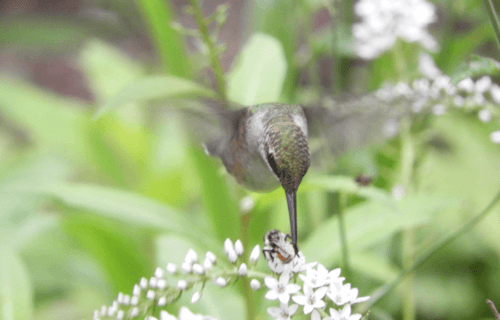RIVERSIDE, Calif. — A hummingbird’s sense of smell may just be its greatest asset. Researchers from the University of California-Riverside report that in a mere matter of milliseconds, a hummingbird can catch a whiff of impending danger and fly the coop. The study is especially noteworthy because, up until now, scientists have believed that hummingbirds don’t have any sense of smell at all!
Some birds have a reputation for having a strong sense of smell. Biologists often call vultures “airborne bloodhounds.”
Vultures enjoy robust odor detection thanks to the large size of their olfactory bulbs, or tissues in the brain that control smell. Hummingbirds, on the other hand, have particularly tiny olfactory bulbs.
Those tiny olfactory bulbs, combined with the fact that prior studies had collected no evidence indicating hummingbirds prefer the smell of flowers containing nectar, led the scientific community to conclude these tiny birds have no sense of smell.
Now, for the first time ever, this study demonstrates that not only can hummingbirds smell insects, but they can also use those scents to evade danger while on the lookout for some tasty nectar.
“This is pretty exciting, as it is the first clear demonstration of hummingbirds using their sense of smell alone to make foraging decisions and avoid contact with potentially dangerous insects at a flower or feeder,” says study co-author Erin Wilson Rankin, associate entomology professor, in a university release.
Which smells do hummingbirds actually pick up?
Study authors gathered 100 hummingbirds and allowed the birds to choose between two feeders: one with just sugar water and another containing sugar water mixed with chemicals that smell similar to insects. Both bird feeders looked exactly the same visually.
The team repeated this process a few different times using different insect scents. One featured the smell of honeybees, while another mimicked an attraction chemical secreted by Argentine ants. Finally, a third chemical smelled like formic acid, a defensive compound produced by certain Formica ants known to harm many birds and mammals.
“If a bird has any exposed skin on their legs, formic acid can hurt, and if they get it in their eyes, it isn’t pleasant,” Prof. Rankin explains. “It’s also extremely volatile.”
The hummingbirds avoided the smells associated with ants, particularly the formic acid. Interestingly the birds didn’t react at all to the honeybee smell, which the insects usually use to stop other bees from visiting flowers.
Do hummingbirds have a thing for ‘Juicy Fruit’?
To refine their findings, study authors also performed another experiment using ethyl butyrate, an additive often found in human food. Researchers tried this to ensure the hummingbirds were not simply reacting to new and strange smells during the earlier rounds.
“It smells like Juicy Fruit gum, which is not a smell known in nature,” Prof. Rankin says. “I did not enjoy it. The birds did not care about it though and didn’t go out of their way to avoid it.”
These findings raise a number of questions about hummingbirds in general, and more specifically, just how much their sense of smell influences daily foraging decisions.
“This research made me understand the importance of studying the basic biology and natural history of animals that are commonly overlooked,” adds first study author Ashley Kim, an ecology doctoral student at UC San Diego.
“Hummingbirds and insects might be competing for floral resources,” she concludes. “Their foraging decisions help us understand how the ecosystem functions, and any actions that ultimately might be needed for conservation.”
The study appears in the journal Behavioral Ecology and Sociobiology.
